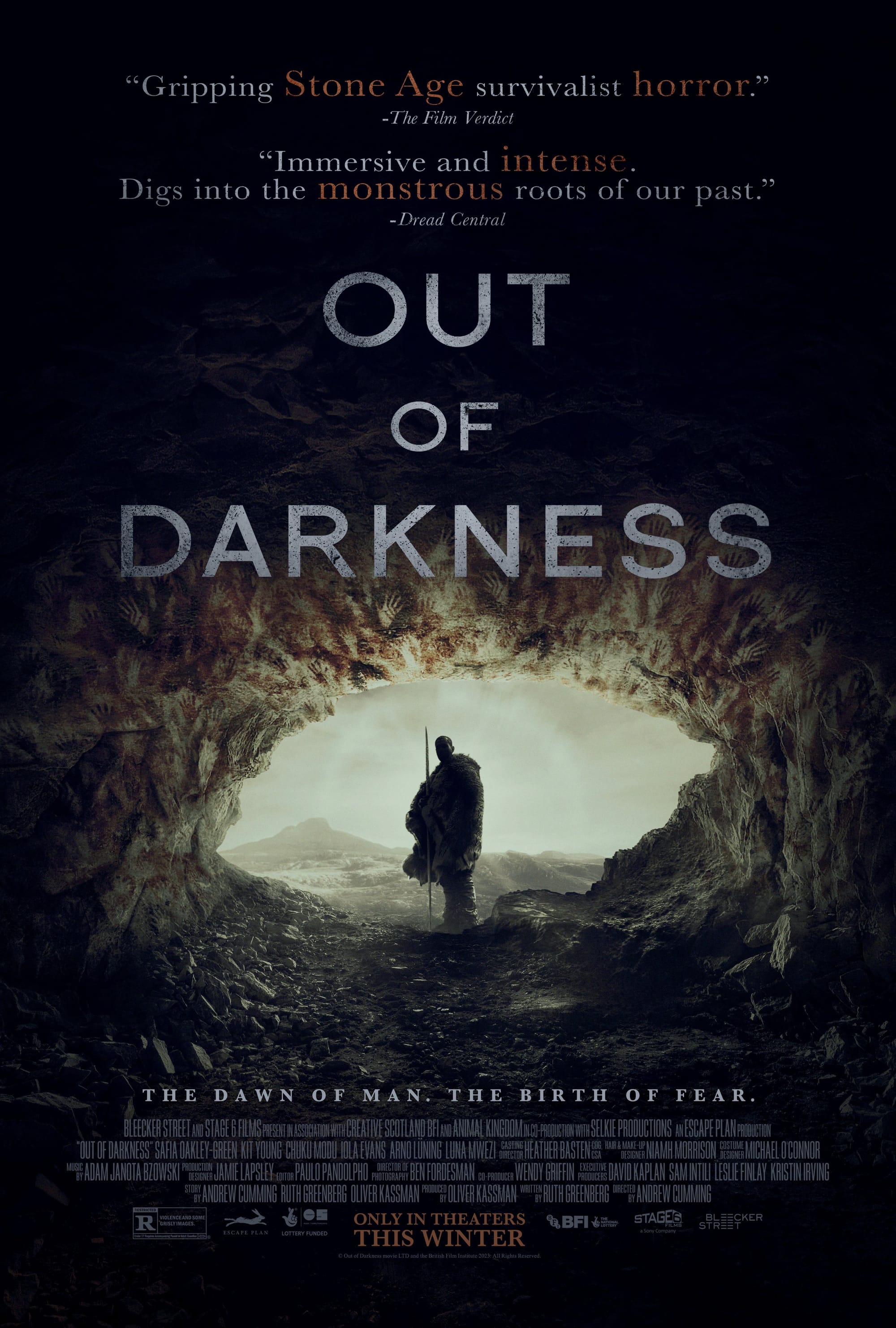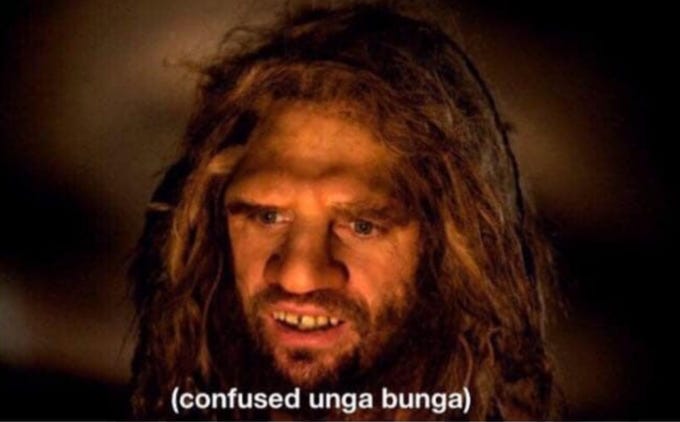Out of Darkness
Hell is other people.

45,000 years ago, a band of early humans looking for a new home come ashore on a strange new land, and soon realize that there is something lurking in the darkness there, and it’s hunting them.
45,000 years ago? But… how can that be? That’s 39,000 years more than what many Christians claim the Earth’s age to be.

So… Out of Darkness opens with six early humans gathered around a campfire, and the rest of the world swallowed up by the surrounding darkness. There’s Adem, the leader and a fierce warrior, Heron, his young son, Ave, who is Adem’s mate and is pregnant with his child, and also Geirr, Adem’s brother, and his loyal second. Outside of the family bond, there’s Odal, an elder who is acting as an advisor to Adem, and finally, there’s Beyah, a young woman and an outsider, a stray who has only recently joined the others on their journey.
The reason this group is sitting around this lonely little fire is because, in another land far away, when their tribe arrived at their northern summer hunting grounds and found no herds waiting for them, the rest of the tribe all decided to head back to their lands in the south. Adem disagreed. Declaring his intent to find a new home, he and the rest of the group journeyed far to the west, and across a raging sea, searching for a storied land of plenty that he had been told about in stories as a child. After a long, dangerous journey, the group finally lands on this distant shore, but instead of finding a green and pleasant land, they find a barren and windswept country waiting for them. That, and something much, much worse… something prowling in the darkness beyond the firelight, something that soon begins to pick them off one by one.
According to the fossil record, Cro-Magnun man permanently settled in Europe between 30,000 to 50,000 years ago. Before that, the continent was dominated for hundreds of thousands of years by the Neanderthals, who… coincidentally… vanished from the fossil record about 40,000 years ago.
Cro-Magnon was the first human ancestor with direct genetic links to us modern humans. They were taller and less muscular than their Neanderthals counterparts. Their facial features were closer to ours too, whereas Neanderthals had prominent brows, broader noses, and thicker mandibles, as well as thicker bones and bodies in general, and larger skulls. They were not as well traveled as the Cro-Magnons, which resulted in a lack of genetic diversity that Cro-Magnons had developed due to having to adapt to living in various environments. Some point to this lack of genetic diversity as having been a factor in Neanderthals’ eventual extinction, but others believe that a scenario of violent conflict and displacement, resulting from the encroachment of Cro-Magnon, is more likely.
I bring this up for reasons that are possibly related to this movie…
Shot in the Scottish Highlands, this barren and inhospitable land our characters find themselves in really is gorgeous, but in a stark and gray kind of way, looking both very beautiful and very hostile. The setting is what drives the main tension of the film, that feeling of being dwarfed by this massively open and empty country, of being so small and vulnerable, along with an overwhelming feeling that you are somewhere you shouldn’t be, but with no other option but to press on. This foreboding feeling of being trespassers only grows stronger once the characters are forced into a thick forest, and find themselves surrounded by massive trees. Between the pitch black darkness at night and the closely looming trees, the mysterious thing that is hunting them seems to be coming at them from all sides at once. The tension is really, really great during all of this, as is the violence and gore, and the way this unseen threat is used really keeps up the suspense.
But it’s maybe done a little too well…
Because the resolution of the film is a bit like letting the air out a balloon, and the tacked-on message that accompanies the root reason for the conflict is so heavy-handed, you can’t help but roll your eyes a bit. Especially because, once you’re given the full explanation, it just doesn’t quite make sense when you try to reconcile it with the events of the film.
But, hey… on the plus side, much like on the tv show Yellowjackets, at least there’s some light cannibalism here for you to enjoy.
Maybe the worst part of this otherwise very enjoyable film, is how the characters speak a language the filmmakers have dubbed as “Tola.” Concocted by a linguist and an archeologist—although, it’s unclear if this was two people working together, or just one person who worked twice as hard—Tola is a made-up language based on Basque and Arabic. This is… as we’ve previously discussed… a complete waste of time, and nothing but a dumb as shit nonsense gimmick. What’s the difference between a fake language and just making noises, if the emotion and intent being expressed is the same? Especially if there’s subtitles? I’ll tell you what the difference is… One cost the filmmakers a bunch more money to develop. I mean, good on the linguists and the archeologists out there for successfully tricking Hollywood into thinking that this is a necessary thing that films and TV shows need to do, but honestly, I can’t believe anyone still falls for this scam.
Also, I can’t help but think, if the filmmakers had spent less time and money developing this stupid Tola nonsense, and more time maybe on working on the film’s ending, Out of Darkness might have turned out to be an actually great film, instead of just a pretty decent one that ends in a lackluster way.
I will say, I did appreciate how the early humans were depicted as not Caucasian, which is not only more in line with current theories about Paleolithic peoples, but will also no doubt upset a bunch of bigots, so there’s that, at least.
Anyway, the vaguely disappointing let-down of the ending aside, and despite being a pretty tense story at times, Out of Darkness is ultimately more sad than it is terrifying, telling a gory and violent parable about desperation, displacement, xenophobia, and the deeply ingrained roots of war within human civilization.
It’s worth checking out, if you have some free time.
